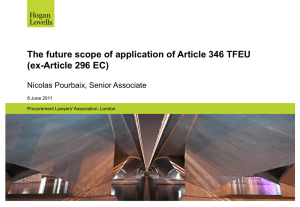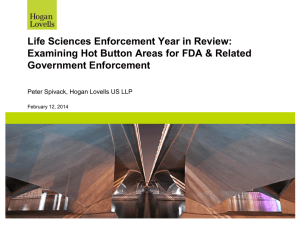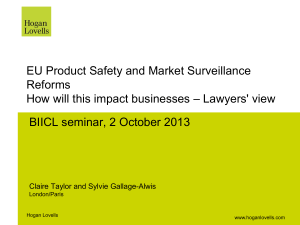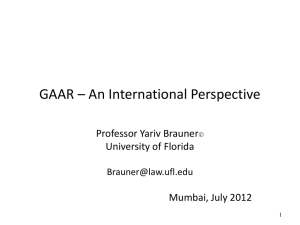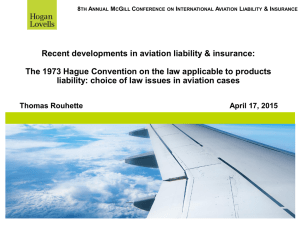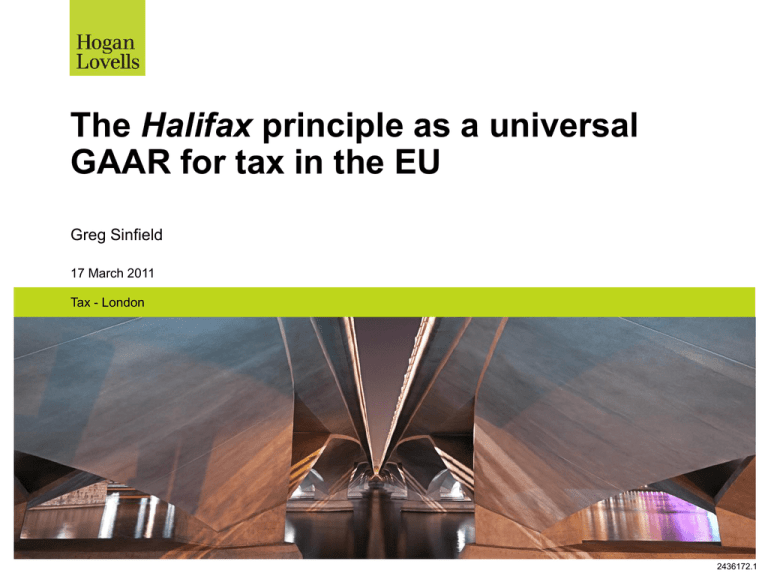
The Halifax principle as a universal
GAAR for tax in the EU
Greg Sinfield
17 March 2011
Tax - London
2436172.1
Issues
• Can the Halifax principle apply to both VAT and
direct tax in the EU as a universal GAAR?
• Will the Halifax principle become a universal GAAR
for tax in the EU?
www.hoganlovells.com
2436172.1
2
Halifax principle (2006)
Where
– transactions result in accrual of tax advantage contrary to
purpose of VAT Directive or national legislation
transposing it
– it is apparent from objective factors that essential aim of
transactions was to obtain tax advantage
the transactions must be redefined so as to reestablish the situation that would have existed in the
absence of abusive transactions
www.hoganlovells.com
2436172.1
3
Techniques of tax avoidance
• Techniques of avoidance are same in both direct
and indirect taxes
– taking advantage of tax breaks in way not intended by
Parliament
– using contrived or artificial schemes
– exploiting loopholes
– circumventing broad purpose of legislation
– circumventing legislative limits
– paying less tax than Parliament intended
– distorting normal commercial or tax collection
mechanisms to gain benefit
www.hoganlovells.com
2436172.1
4
TLRC GAAR (1997)
"Where a person carries out a tax driven
transaction, he shall be taxed as if he had carried
out the normal transaction.
If, because the tax driven transaction does not have
any non-tax objective, there is no normal
transaction then he shall be taxed as if it did not
take place."
www.hoganlovells.com
2436172.1
5
Draft CCCTB Directive GAAR (2011)
"Artificial transactions carried out for the sole
purpose of avoiding taxation shall be ignored for the
purposes of calculating the tax base.
The first paragraph shall not apply to genuine
commercial activities where the taxpayer is able to
choose between two or more possible transactions
which have the same commercial result but which
produce different taxable amounts."
www.hoganlovells.com
2436172.1
6
Objections to Halifax as universal GAAR
• Objections
–
–
–
–
Too high level
Only applies to EU law and national law transposing it
Subject to change by ECJ without consultation or scrutiny
Development slow and dependent on cases
• Solution
– Legislation at EU and national levels
www.hoganlovells.com
2436172.1
7
Will Halifax principle become universal GAAR?
• Benefits of Halifax as universal GAAR
–
–
–
–
Practice and case law develop more quickly
Halifax principle already established with body of case law
Universal GAAR would not be anti-competitive within EU
Greater consistency between different taxes and at
national and EU levels
– No (or reduced) need for clearance procedure
www.hoganlovells.com
2436172.1
8
Will Halifax principle become universal GAAR?
• Halifax principle already developing as universal
GAAR
• Article 80 draft CCCTB Directive
• Italian references to ECJ (C-417/10 and C-529/10)
"Does the abuse of rights principle in taxation matters ...
extend ... to matters involving non-harmonised taxes, such as
direct taxes, where the tax relates to cross-border financial
matters?
Is there a Community interest in provision being made by the
Member States for adequate anti-avoidance measures in the
field of non-harmonised taxes, and is such an interest thwarted
by the failure to apply the abuse of rights principle?"
www.hoganlovells.com
2436172.1
9
Conclusions
• Halifax principle is capable of being universal GAAR
for tax in the EU
• It requires both EU and national legislation
• ECJ jurisprudence and EU legislation are
developing universal GAAR for tax in the EU
www.hoganlovells.com
2436172.1
10
Greg Sinfield
Partner, London
T +44 (0) 20 7296 5415
greg.sinfield@hoganlovells.com
www.hoganlovells.com
Hogan Lovells has offices in:
Abu Dhabi
Alicante
Amsterdam
Baltimore
Beijing
Berlin
Brussels
Budapest*
Caracas
Colorado Springs
Denver
Dubai
Dusseldorf
Frankfurt
Hamburg
Hanoi
Ho Chi Minh City
Hong Kong
Houston
Jeddah*
London
Los Angeles
Madrid
Miami
Milan
Moscow
Munich
New York
Northern Virginia
Paris
Philadelphia
Prague
Riyadh*
Rome
San Francisco
Shanghai
Silicon Valley
Singapore
Tokyo
Ulaanbaatar*
Warsaw
Washington DC
Zagreb*
"Hogan Lovells" or the "firm" refers to the international legal practice comprising Hogan Lovells International LLP, Hogan Lovells US LLP, Hogan Lovells Worldwide Group (a Swiss Verein), and their affiliated businesses,
each of which is a separate legal entity. Hogan Lovells International LLP is a limited liability partnership registered in England and Wales with registered number OC323639. Registered office and principal place of
business: Atlantic House, Holborn Viaduct, London EC1A 2FG. Hogan Lovells US LLP is a limited liability partnership registered in the District of Columbia.
The word "partner" is used to refer to a member of Hogan Lovells International LLP or a partner of Hogan Lovells US LLP, or an employee or consultant with equivalent standing and qualifications, and to a partner, member,
employee or consultant in any of their affiliated businesses who has equivalent standing. Rankings and quotes from legal directories and other sources may refer to the former firms of Hogan & Hartson LLP and Lovells
LLP. Where case studies are included, results achieved do not guarantee similar outcomes for other clients. New York State Notice: Attorney Advertising.
© Hogan Lovells 2011. All rights reserved.
* Associated offices

